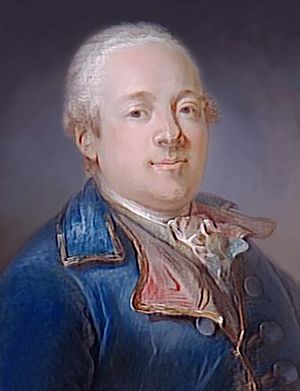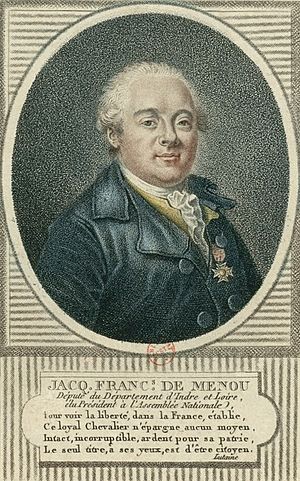Jacques-François Menou facts for kids
Quick facts for kids
Jacques-François Menou
|
|
|---|---|
| Baron of Boussay | |

Jacques-François de Menou, by Joseph Ducreux
|
|
| Born | 3 September 1750 Boussay, France |
| Died | 13 August 1810 (aged 59) Venice, Italy |
Jacques-François de Menou, also known as Abdallah de Menou, was a French general and important figure during the time of Napoleon. He was born on September 3, 1750, and passed away on August 13, 1810. He is most remembered for his part in Napoleon's Egyptian Campaign from 1798 to 1801.
Contents
Menou and the French Revolution
Jacques-François de Menou was born in Boussay, a town in central France. His family was very old and well-known. By 1789, he had become a high-ranking military officer, called a Maréchal de camp.
Joining the Estates General
In 1789, he was chosen by the nobles of Touraine to join the Estates General. This was a big meeting in France where different groups of people discussed the country's problems. Menou was a noble who believed in new ideas and supported the changes happening in the National Constituent Assembly. This assembly was a new government body. He was even elected as its secretary in December and later became its president for two weeks in 1790. He also helped with diplomatic matters.
Military Service in France
After the National Assembly finished its work in 1791, Menou continued his military career. He served as a Maréchal de camp in Paris. Later, he was sent to the Army of the West. He fought in the Vendée region in 1793, where there was a major uprising against the new government.
In 1795, he was in charge of a part of Paris during a rebellion. He successfully made the rebellious area of Faubourg Saint-Antoine give up. He was then made the general in chief of the Army of the Interior. However, he was accused of being disloyal and put on trial. Luckily, he was found innocent in 1795.
Campaign in Egypt
In 1798, Menou was one of the five division commanders in the Armée d'Orient. This army was part of Napoleon's famous campaign in Egypt.
Leading the French in Egypt
After the French general Jean-Baptiste Kléber was assassinated in June 1800, Menou took over as the main general in Egypt. He became the new leader of the French forces there. However, he was not as popular as Kléber and did not have as much support from the other officers. During his time in Egypt, Menou married an Egyptian woman named Zubaidah bint Muhammad El Bawwab, who was the daughter of a wealthy family. He also converted to Islam and changed his name to Abdallah.
Battle of Alexandria and Surrender
On March 21, 1801, Menou led the French army to fight against British forces landing at La Muiron. The French lost this battle. Menou then retreated to Alexandria. After a long siege, he surrendered to the British on August 30, 1801.
As part of the surrender agreement, Menou was allowed to take the remaining French soldiers home. In return, he had to hand over the Rosetta Stone. This stone was a very important discovery because it helped people understand the ancient Egyptian language of hieroglyphics, which had been lost for a long time.
Later Life and Legacy
After returning to France, Menou continued to serve the country.
Roles in the Empire
In 1802, he became a member of the Tribunat, which was a government body that discussed laws. Soon after, he became an administrator in the Piedmont region of Italy. He was also honored with important awards, becoming a member of the Legion of Honor in 1803 and a Grand Officer in 1804. In 1808, he was given the title of comte de l'Empire, which means Count of the Empire.
Governor of Venice
Menou made important contributions to the French Empire in Italy. He was made a Knight of the Order of the Iron Crown in 1807. This happened shortly after he was appointed as the Governor of Venice. He held this important position until he passed away on August 13, 1810, near Mestre.
General Menou's name is carved on the Arc de Triomphe in Paris, on the south side. This is a great honor for important French military leaders. He had one son with Zubaidah El Bawwab, named Jacques Mourad Soliman, who was born in Egypt in 1800.


